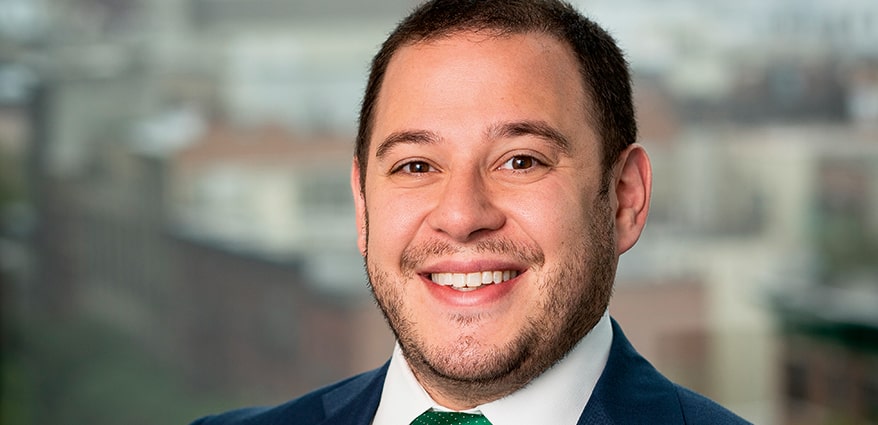
“I SAVED MY STACK OF REJECTIONS from hundreds of law
firms when no one was hiring,” says Andrew Bochner ’12,
now the intellectual property counsel at Click Therapeutics,
a medical software developer based in New York. “That
stack still motivates me. It reminds me that all it takes is one
chance, or one opportunity, for everything to change.”
As a pre-med biology major at Yeshiva University,
Bochner wanted to be a doctor—until he learned about
patent law during his junior year. After making a quick
pivot from studying for the MCAT to taking the LSAT, he
won a full scholarship to Brooklyn Law School. Today,
he works at the forefront of biotech, software, and
intellectual property in a fast-changing field.
Digital therapeutics companies like Click Therapeutics
employ technology to supplement or replace traditional
clinical therapy. Patients are prescribed software as a
medical device that could work alongside or in place
of drug treatments. For example, the software could
use cognitive or motivational stimulation to promote
behavioral change, and capture data to track progress. Digital therapeutics apps focus on delivering clinical
outcomes and are validated through rigorous clinical
trials. As software therapeutics, Click’s products are
personalized to optimize engagement and outcomes.
Click Therapeutics’ current product, an app called
Clickotine, is marketed directly to consumers to help
them quit smoking. To expand its future reach, the company
is focusing on prescription-only products, said Bochner, who
is responsible for all facets of IP, licensing, and related
transactional matters.
In January, Click Therapeutics announced a $300 million
partnership with Otsuka America, a subsidiary of a Tokyo-based
global pharmaceutical company, to develop an FDA-approved app
to treat major depressive disorder.
“The app is based on Emotional Faces Memory Task technology,
which is a proprietary system monitored by doctors to trigger
neurobiological responses in the brain related to cognitive control
and emotion processing,” Bochner said.
The path into biotech and patent law for Bochner was somewhat
circuitous. He first worked as an intern for Celgene, a global
biopharmaceutical company, during his second summer and third
year of law school.
“At Celgene, I learned the importance of talking to my clients—
the scientists and inventors—and just schmoozing with them,”
he said. “I found out what they were working on and sometimes
discovered that what they thought was insignificant could actually be
a critical development in the patent world. I was learning by doing.”
Then, during his last semester of law school, he interned at
Weiss & Arons, a patent firm in the New York City suburbs, which
offered him his first job as an associate after graduation. “That firm
focused on software and medical device work, which opened up a
whole new field I was excited to explore,” Bochner said. He later
added to his experience and expertise in intellectual property as
associate at Cowan, Liebowitz & Latman and at Wiggin and Dana,
both in New York. His legal and scientific paths finally merged at
Click Therapeutics.
“Because of my background in biology, as well as technology
and software, the opportunity at Click was a perfect fit for me,”
said Bochner. Today, he shares his career experience and wisdom as
an advisor with the Brooklyn Law Incubator & Policy (BLIP) Clinic.
“Law students should remember that their career is built on
more than one job,” he said. “It’s built on experiences and having a
network of people to call on in the future. So many people I met at
Brooklyn continue to help me now with their friendship and advice.
And for that, I’m grateful.”
—by Elaine Friedman